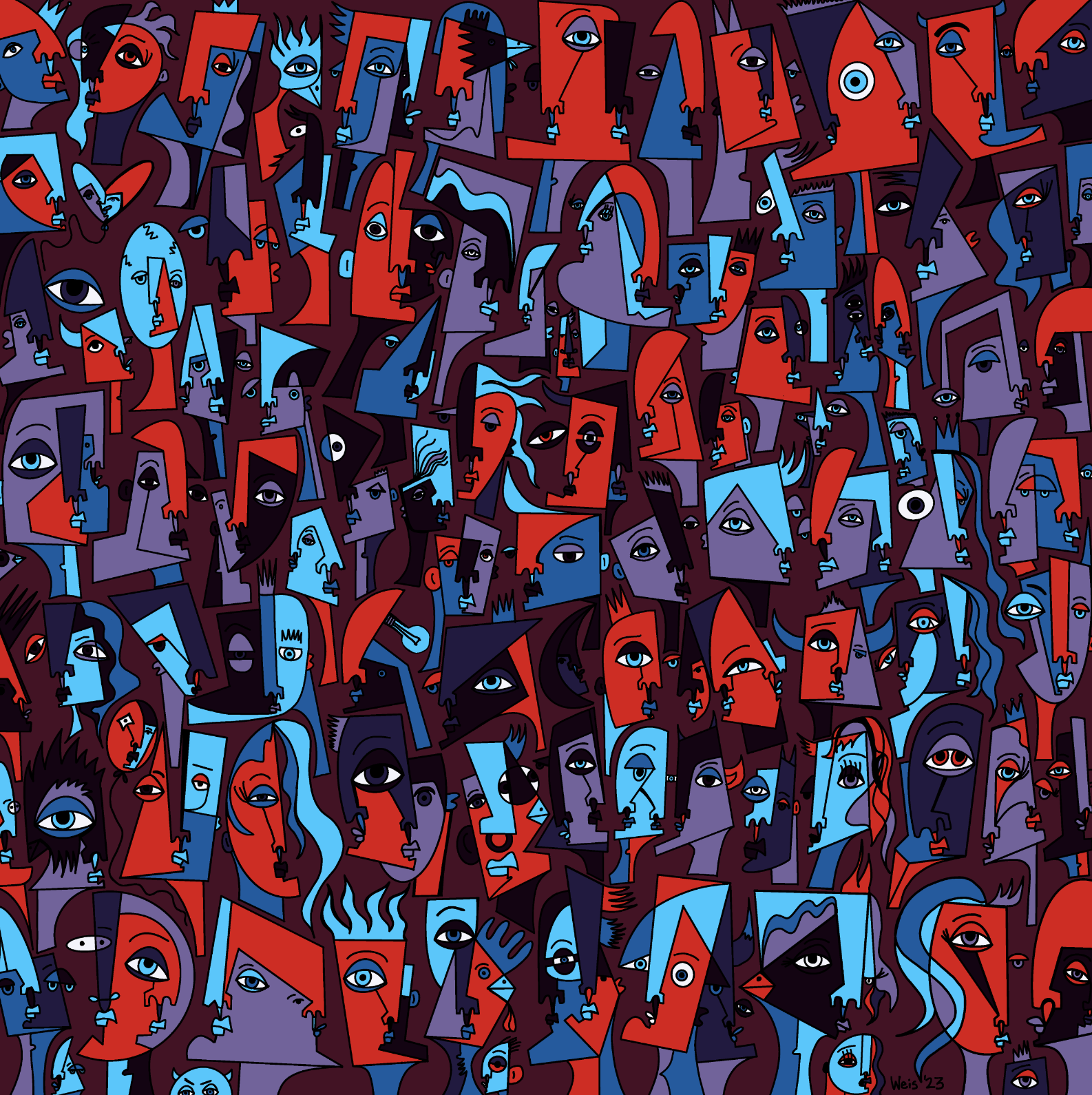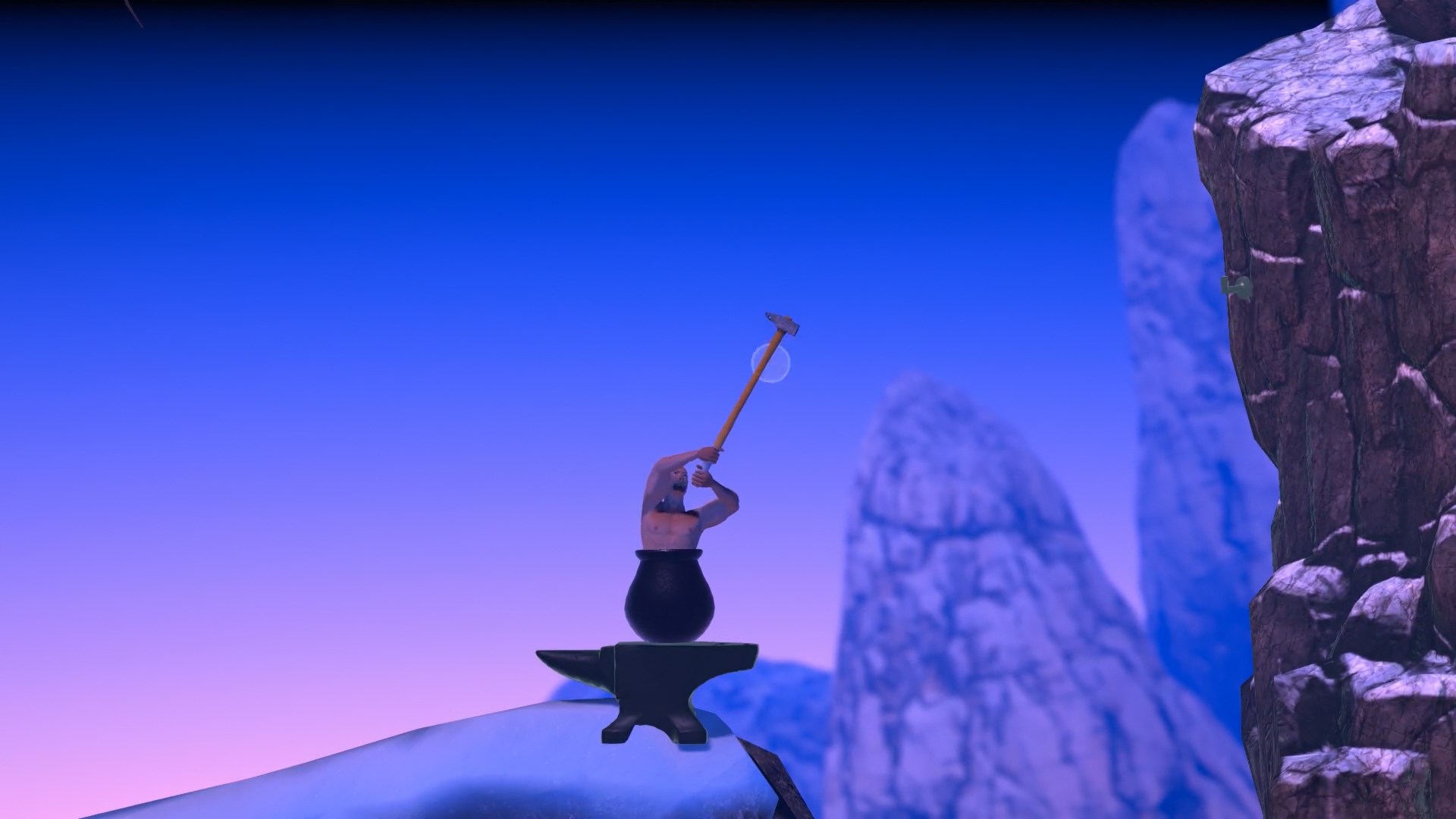December 11th, 2022
Author:
J.R. Han
New York based designer, developer and photographer.
Relevant posts:
360,000
Encrypted Morons: Why Do We See Value in Digital Tokens?

United Nations Fly-in at New York JFK
Sept 16th, 2023
A special day at JFK when governement aircrafts leaders/officials of many nations arrive for the UN assembly.
Rain and night at Newark EWR
Sept 10th, 2023 A local group spotting event at Newark and Elizabeth, NJ.
A local group spotting event at Newark and Elizabeth, NJ.Starting Over Getting Over it With Bennett Foddy With Ryan Han: Frustration in a Digital Landfill

“There is no feeling more intense than starting over ...” Bennett Foddy’s commentary cut in as I, after several attempts, finally climbed over a dead tree that had blocked me from the rest of the game. There, my task was using my cursor to control a peculiarly buttery sledgehammer to propel my avatar – a muscular man with his lower body mounted into a cauldron – up a monstrous mountain of rock, buildings, and trash. After the first few minutes of this seemingly easy ascent, I found myself beaten by a narrow vertical notch between rocks with only two unreasonably distanced lanterns for my hammer to latch on. My breathing accelerated, as my hands began to quiver, leaving sweat stains on the trackpad. I carefully pushed myself up and mounted my hammer onto the lantern, and then the second lantern, and then the top edge of the notch. The clattering of the hammer and rocks was as intimidating as a ticking clock. In a second, my index finger quickly scratched across the trackpad. The pluck of the hammer slingshotted me into a projectile path, and I was out of the hole. But I pushed too far; it launched me over that edge and off the cliff. I saw the granite rocks I once laboriously conquered shifting up out of sight, out of reach. After an irreversible and despairing fall, I landed, with a clangor, and some water spilled out of my cauldron, next to the dead tree, the place where I started.
“There is no feeling more intense than starting over.”

Getting Over it With Bennett Foddy is a 2017 platform game by, you guessed right, Bennett Foddy. It has failure and frustration built in as game mechanics, which means it’s almost inevitable for all beginners to suffer the sense of frustration on their first ascent. At the bottom of the mountain, I had just climbed, and fallen from, I resented this design concept. Why design a game with such frustration? Shouldn’t games be enjoyable?
In the game’s commentary, Foddy acknowledged that Getting Over it is a homage to a 2002 game called Sexy Hiking made by a Czech designer named Jazzuo. In the game, the task is also to drag your avatar up a mountain using a hammer, and experience similar mentally-tormenting frustration. In a 2007 game review of Sexy Hiking on TIGSource, game designer Derek Yu explained what made the game extremely grueling – “there is nothing there to help you save your own grit”. However, it is a perfect embodiment of Foddy’s definition of B-games – “rough assemblages of found objects”, which perhaps summarizes the characteristics of the entire B-cultured products – low budget, low quality, meaningless; creators made them for the enjoyment of making and to hell with the audience or player experiences. Today's digital culture is heavily built upon this casualness, ever since the genesis of our digital world. In 2000, novelist Hal Niedzviecki published the article “When Junk Culture Became a Way of Life”, in which he listed out valueless “digital trash” cartoons like Beavis and Butt-head and cried that “culture is dead”. And in 2013, editorial director Joshua Fruhlinger in the blog This is the Modem World defined games like Diner Dash, Candy Crush Saga, and many others as “digital junk food” – enjoyable content with low nutritious value. In Niedzviecki’s and Fruhlinger’s view, this is a culture in which junk, low artistic and low moral value gags and features, are being reused and repurposed, to produce newer junk. And the B-graded designers and filmmakers take turns chewing on the same piece of tasteless gum; they catch it with their mouth, chew on it for a minute or two, and then spit it into the mouth of the next. However, for Fruhlinger to define “digital junk food” would imply that there are digital contents that are good for consumption. In this sense, Sexy Hiking could be something in between. Intriguingly, Foddy did recognize something valuable from the content in a morally bereft medium which Foddy wants no part of. Unlike Jazzuo, who might not have intended to make a frustrating game, Foddy said in the trailer that he made this game for “a certain kind of person, to hurt them”.

I was hurt, again and again. As the muscle memory accumulated, I managed to find an easier way to pass that notch: if I continuously softly swing the hammer left and right, drub on the two sides of the notch, the tiny upper lift generated by each knock will slowly elevate me up from the notch, without having to generate a momentum that can overshoot and spaghetti me off the cliff. I got over it. After a brief inner delight of overcoming an obstacle on my own, I resumed my ascent. I climbed up a construction site, through the floating landfill, and up to a place unofficially named the Orange Hill, or more commonly known as the Orange Hell. It is a cliffside opening of a cave. To get over this, I have to push and swing myself out and up from the cave and onto the rock above. But I was wrong. When I launched myself up and tried to wedge my hammer, the rock was too slippery and shear. I began to slide. I desperately reached my hammer towards the rock, trying to gain friction, but that only worsened the case, pushing me off that cliff, down to the dead tree.
“There is no feeling more intense than starting over.”

As Cliff Carlisle’s version of “Going Down the Road Feelin’ Bad”' started to play from the game, I gradually curbed my frustration, pondering whether I’m the certain kind of person Foddy intended to hurt. In a 2018 interview conducted by game journalist Jody Macgergor, Foddy said when he first showed Sexy Hiking to his students at NYU Tisch School of the Arts, their reactions were polarized. Some were infuriated and stopped playing, and few were into it. What Foddy provided here were the two possible outcomes of player reactions to repetitive and consecutive failures, yet I didn't feel myself conforming to any of them. But as I went down this road, I was not feeling good, so I began reading my frustration. Sigmund Freud wrote in his 1912 article “Types of Onset Neurosis” that one of the main causes of frustration is the failure to receive gratification from something proven to do so in the past. For beginners, falling is guaranteed in the game, hence we suffer a merry-go-round of conquering and losing, piling up the frustration. Consequently, when we are emotionally on tilt, we become obsessed with gaining back the progress we lost, but our moves become clunky with irritation and we end up losing even more. This solders the cause and effect of frustration together into a vicious cycle. I realized that it is not the game that’s punishing, but it’s giving you a place to dam-up your frustration, hence punishing yourself. The frustration is inevitable, but we can choose to opt-out of it and not be hurt. On the contrary, Foddy hurts those who aren't capable of walking out of the vicious cycle, those who are adapted to the most straightforward way of consuming prefabricated enjoyment. Playing Getting Over it means to them, well, starting over.
“And there is no feeling more intense than starting over.” The year Getting Over it was released, game difficulties became a hot discussion topic among players and reviewers. Is Getting Over it way too hard? In a 2018 article “Where Things Grow: Failure and Frustration as Game Mechanics in ‘Getting Over it With Bennett Foddy’”, game reviewer Flora Merigold recognized the game as a test, rather than a game. “It tests patience. It tests remembrance.” News editor Allegra Frank commented in her 2017 review “Getting Over it is frustrating the hell of streamers” that the game is more amazing to watch them play. From their standards of digital enjoyment, the moment a game starts to challenge your patience it diverts from being a game, and the pre-digested enjoyment derived from watching streaming is truly “amazing”. It isn’t that the game is hard, but that the digital world is getting easier. It's a world in which we have a glut of canned pleasure delivered to our spiritual doorsteps at any time. It’s a world in which many take shelter from the obstacles in real life. It’s a world without frustration, without failure, without challenges.

After spending two and a half hours in the game, falling down and climbing back up repeatedly, I got to the foot of the ice cliff – a steep-sloped slippery surface situated at the split of the atmosphere and outer space, where the sky glows in an ambitious and vibrant violet vibe. It is where gravity becomes more forgiving, and so am I. As my ascent resumed, I wasn’t perturbed by the potential loss of progress. I learned to minimize loss by refraining from desperate saves that could push me off, allowing a minor loss to prevent a major loss. Above all, learning from my mistakes had guaranteed every starting-over was worthwhile. Conventionally, platform games measure progress by distance. But in Getting Over It, progress was never the climb, but the intangible assets of skill and muscle memory. Even if I fall to the start, I would still be able to gain back my loss with ease. In this sense, progress is internal; it’s an intellectual growth that you don’t lose once you earn it. The climbs were harder and the slopes were steeper, but knowing that my internal progress is secured, I felt that I was getting closer to the end.
And just like that, I beat the game, in 2 hours, 58 minutes, and 31.407 seconds.
I got over it.

But there’s something I missed, something that could possibly explain the value behind all of this. In Foddy’s commentary within the game, he harangued the formation of the mountain, the game, the culture, but not the character – a muscular man with his lower body mounted into a cauldron. As I was propelling myself up the ice cliff, Foddy introduced the man’s name – Diogenes, the Greek philosopher known for living in a wine cask and rejecting all necessities in life. He held up a lantern in the faces of Athens citizens, searching for an honest man unaffected by a lie called manners, that conceals one’s truthfulness. In historian Joshua J. Mark’s encyclopedic article of “Diogenes of Sinope”, when Plato was complimented on his definition of human: a featherless biped, Diogenes plucked a chicken and held it in front of the students at Plato’s academy, saying: “behold! Plato’s human!” Hence, Plato’s definition was knocked off from its high standing and back to the start.
“And there is no feeling more intense than starting over.” Plato then amended the definition by appending traits like “broad, flat nails”, trying to keep its preeminence. But such change is yet to be predominantly seen in today's virtual Athens – the internet. Instead, when Foddy stacked a digital landfill into a mountain and handed gamers a hammer and said: “Behold, internet’s enjoyable game”, people bought into this game since it’s theoretically made of trash and gameplay videos of it were seemingly entertaining. This would resemble an absurdly made-up scenario in which the people of Athens each purchased a plucked chicken, observed it, fed it, talked to it, and then found out it wasn’t human at all. And this realization was intense. The moment these virtual Athenians set foot into Getting Over it, they fall into the trap Foddy set up just for them, a punishment for their short-temperedness from an inert routine feeding on prefabricated and pre-digested pleasures. Their preferences of contents made them suck on a sugarcoated tablet and spit it out immediately as its sugar dissolved and starts to taste bitter. To them, challenges were such a chore that they relied on others to do it for them, but on this hike, “there is nothing there to help you save your own grit”. Foddy is in search of people of his own kind, by swinging the lantern of frustration in the faces of people on the internet, looking for those who remained truthful from the digital junk culture, and appreciating those who are, punishing those who aren’t. This is perhaps a culture that frustrated Foddy. In a case like this, the question is no longer why making a frustrating game, but why not. Thus, he embodied the digital landfill into the game, and overcame his own frustration, and now challenges us to get over it.

Looking back on my hike, I realized how frustration brought me to the top. As I read my frustration, I noticed that it reminded me of my mistakes every time I start over. Just like how I found newer and easiest ways of climbing, how Plato amended the definition of human, and how Foddy embodied his strong statement against the culture he hated, frustration fosters change – something that makes every starting-over worthwhile. I’m unsure if Foddy intended this, but the outcome of Getting Over it’s frustration wasn’t as black and white – punishment or appreciation – as he implied, but it changed me perhaps from one state to another. As someone who has permanent residence yet not full citizenship in the digital world, I was brought out of the state of not knowing that had long mellowed me in a domain with no challenges. Intellectually, suffering and overcoming frustration makes people more prepared for further frustrations, challenges, and opportunities. And back to the question of “shouldn’t games be enjoyable?” The answer is yes, and Getting Over it With Bennett Foddy is not an exception. It does reward winners in many ways: get to join an online club of winners, get to email Foddy himself, and the cauldron becomes gold after fifty wins. But as Sigmund Freud once said, “maturity is the ability to postpone gratification”. On the journey of earning the postponed reward, if we see progress merely as the vertical climb, the frustration gets us and stops us from winning. However, if we measure progress as our internal growth, the frustration goes away more. As you climb up a path you’ve done so countless times, or a place where you know every drag, every nudge, and every swing by heart, a subtle sense of ease and accomplishment is derived. It’s the true reward we eventually deserve as conquers over the “it” in the game’s title – the digital culture junkyard and our own frustration.

After my first victory, I strived for the fiftieth win and the golden cauldron. But on my ninth run, I felt that winning came too easy. Foddy knew that some of us would feel this way, so he put, under the ice cliff, a snake that would slide you back to the dead tree if you hoisted yourself on it. Hence, to taste the fruit of my frustration once more, I hooked my hammer onto the snake and allowed myself to fall freely.
“And there is no feeling more intense than starting over.”

References
Carlisle, Cliff. “Goin' Down the Road Feelin' Bad .” Goin' Down The Road Feelin' Bad / Dang My Rowdy Soul, Perfect, New York, NY, 28 July 1933.
Foddy, Bennett. “Getting over It with Bennett Foddy.” Bennett Foddy, 2017.
Freud, Sigmund. New Introductory Lectures on Psycho-Analysis. Authorized Translation.
Hogarth Press, 1933.
Freud, Sigmund. “Types of Onset of Neurosis (1912).” PsycEXTRA Dataset, 1971,
https://doi.org/10.1037/e417472005-293.
Fruhlinger, Joshua. “This Is the Modem World: Digital Junk Food.” Engadget, 15 May 2013,
https://www.engadget.com/2013-05-15-digital-junk-food.html.
Jazzuo. “Sexy Hiking.” Jazzuo, 2002.
Macgregor, Jody, et al. “The Creators of Spelunky and Getting Over It Talk about Sexy Hiking
and 'B-Games'.” PCGamer, 11 Apr. 2018, https://www.pcgamer.com/the-creators-of- spelunky-and-getting-over-it-with-bennett-foddy-on-sexy-hiking-and-b-games/. Accessed 4 Dec. 2022.
Mark, Joshua J. “Diogenes of Sinope.” World History Encyclopedia, 2 Aug. 2014, https://www.worldhistory.org/Diogenes_of_Sinope/. Accessed 5 Dec. 2022.
Niedzviecki, Hal. “When Junk Culture Becomes a Way of Life.” The Globe and Mail, The Globe and Mail, 20 July 2000, https://www.theglobeandmail.com/arts/when-junk-culture- becomes-a-way-of-life/article1041153/.
Yu, Derek. “Sexy Hiking.” TIGSource, 13 Aug. 2007, https://www.tigsource.com/2007/08/13/sexy-hiking/. Accessed 4 Dec. 2022.

